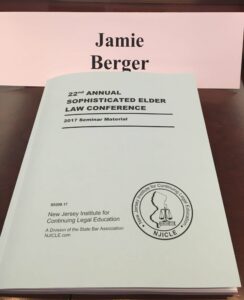Jamie Berger, Esq.
Major v. Maguire provides guidance to Trial Courts on whether and how to let grandparents’ motions for visitation proceed, with consideration of grandparents’ rights, but with the most important factor being the best interests of the child.
In Major v. Maguire, the NJ Supreme Court overturned the Trial Court’s dismissal of a case in which grandparents had tried to secure visitation rights to their granddaughter under the Grandparent Visitation Statute, N.J.S.A. 9:2-7.1. In the Trial Court, Anthony and Suzanne Major claimed that they had been very involved in their granddaughter’s life, despite her parents’ separation, until the death of her father, their son, Chris Major, in 2013. After that, they claimed, the girl’s mother, Julie Maguire, had restricted visitation to only two visits, total. A 2003 case, Moriarty v. Bradt, established that, in order to be granted visitation under N.J.S.A. 9:2-7.1, grandparents must show that the child would suffer harm without the visitation. Following Moriarty, the Majors argued that, absent visitation with them, their granddaughter would suffer harm. Ms. Maguire moved for dismissal.
The Trial Court granted the motion for dismissal, saying that the Majors had not met the burden of showing specific harm to their granddaughter, and that they should have attempted to work out the matter with Ms. Maguire without resorting to litigation. Before granting dismissal, the Trial Court had not given the Majors the opportunity to conduct discovery, call an expert witness, or pursue mediation with Ms. Maguire.

Further, the Supreme Court established a test to determine when grandparents should have the opportunity to prove harm in cases such as Major v. Maguire, when a custodial parent’s motion for dismissal could prevent the grandparents from showing harm. In these cases, the Court ruled, trial courts must weigh the complexity of the case against the intrusiveness of the effort to show harm. That effort may require discovery and expert testimony, and thus a case management conference. All of these could interfere with the privacy of a family and drain its resources, so they are neither necessary nor appropriate in every case. In cases that are not complex, the parties may turn to summary action, with or without case management and discovery.

Central to this test was the Supreme Court’s desire to minimize any harm to the child that might result from a potentially intrusive effort to prove harm from lack of visitation by grandparents. The rights of grandparents and the best interests of the child must both be taken into account, but the best interests of the child take precedence.
Ms. Berger’s presentation on Grandparents Visitation Rights was given at the Elder Law Conference, organized by the New Jersey Institute for Continuing Legal Education, a fully accredited CLE provider in NJ, NY & PA.
For more information, or to talk about your child custody options with one of our licensed and experienced New Jersey matrimonial law attorneys, please reach out to our office at 973-710-4366.






